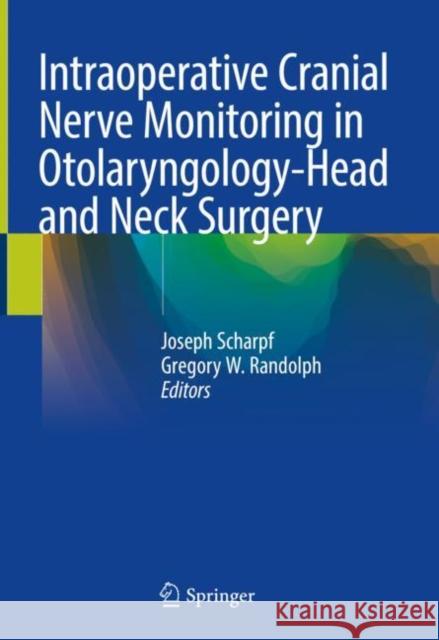Intraoperative Cranial Nerve Monitoring in Otolaryngology-Head and Neck Surgery » książka



Intraoperative Cranial Nerve Monitoring in Otolaryngology-Head and Neck Surgery
ISBN-13: 9783030849153 / Angielski / Twarda / 2022
Intraoperative Cranial Nerve Monitoring in Otolaryngology-Head and Neck Surgery
ISBN-13: 9783030849153 / Angielski / Twarda / 2022
(netto: 575,06 VAT: 5%)
Najniższa cena z 30 dni: 578,30
ok. 16-18 dni roboczych.
Darmowa dostawa!
Part I: Nerve Monitoring Principles.- Historical Perspective on Nerve Monitoring during Head and Neck Surgery.- Basic and Advanced Electrophysiology.- Anesthesia Considerations and Set-up.- Neural Injury Mechanisms.- Education.- Part II: Vagus/Recurrent Laryngeal Nerve Monitoring.- Rationale and Indications for Vagus/Recurrent Laryngeal Nerve Monitoring.- methods for Vagus/Recurrent Nerve Monitoring.- Monitoring of the Superior Laryngeal Nerve.- Continuous Intraoperative Neuromonitoring (CIONM).- Emerging Trends for Vagus/Recurrent Laryngeal Nerve Monitoring.- Troubleshooting System Integrity.- Managing Loss of Signal.- Incorporating Never Monitoring into the Intraoperative Management of Invasive Thyroid Cancer.- Nerve Monitoring in Remote Access Thyroid Surgery.- Nerve Monitoring in Parathyroid Surgery.- Part III: Facial Nerve, Glossopharyngeal Nerve, Hypoglossal Nerve Monitoring.- Facial Nerve Monitoring, Extratemporal Facial Nerve.- Spinal Accessory Nerve Monitoring.- Glossopharyngeal Nerve and Hypoglosssal Nerve Monitoring.- Part IV: Miscellaneous Nerve Monitoring Considerations.- Documentation and Reimbursement.- Ethical Considerations in Nerve Monitoring.- Nerve Monitoring and Medical Malpractice.
Joseph Scharpf, MD, FACS
Director of Head and Neck Endocrine Surgery
Head and Neck Institute
Cleveland Clinic Foundation
Cleveland, OhioGregory W. Randolph, MD, FACS, FACE, FEBS (Endocrine)
Professor of Otolaryngology Head and Neck Surgery,
Harvard Medical School
Division of Thyroid and Parathyroid Endocrine Surgery
Department of Otolaryngology-Head and Neck Surgery
Massachusetts Eye and Ear Infirmary
Boston, MA, USA
Joseph Scharpf, MD, FACS, is a Staff Member of the Cleveland Clinic’s Head and Neck Institute in the Head and Neck Surgery section. He is board-certified in Otolaryngology, Head and Neck GeSurgery. He serves as the Director of Head and Neck Endocrine Surgery at The Cleveland Clinic.
He has published numerous journal articles and multiple book chapters on thyroid, parathyroid disease, head and neck cancer and reconstruction, and has delivered numerous presentations both nationally and internationally. Dr. Scharpf also serves as an educator, teaching medical students, residents, and fellows. He is a reviewer for several major scientific journals in his field and has served as a consultant for ThyCa, an organization dedicated to the well-being of those afflicted with thyroid cancer. Dr. Scharpf is a Fellow of the American College of Surgeons, a member of the American Academy of Otolaryngology-Head and Neck Surgery, the American Thyroid Association, and a member of the American Head and Neck Society.
With more than 25 years of experience in otolaryngology, Dr. Gregory Randolph specializes in thyroid and parathyroid surgery. He is a Professor of Otolaryngology at Harvard Medical School, the Claire and John Bertucci Endowed Chair in Thyroid Surgical Oncology, and a surgeon at Mass. Eye and Ear, where he also serves as the Division Chief of both the General Otolaryngology and Thyroid and Parathyroid Endocrine Surgery Divisions. Dr. Randolph has a thyroid and parathyroid surgical practice, seeing patients and operating at both Mass. Eye and Ear and Mass General.
Dr. Randolph was the first otolaryngologist member of the American Association of Endocrine Surgeons (AAES), the first otolaryngologist member and council member of the International Association of Endocrine Surgeons (IAES), and the first otolaryngologist and United States surgeon to be board-certified in endocrine surgery in the European Union. Alongside Dr. Henning Dralle of Germany, he founded the Global International Neural Monitoring Study Group, which has generated multiple publications and standards guidelines for neural monitoring at thyroid surgery.
With more than 155 peer-reviewed publications, Dr. Randolph has focused the bulk of his research on recurrent laryngeal nerve anatomy, preservation, and monitoring during thyroid cancer surgery, with a concentration on the importance of laryngeal exams, the recognition of lymph node metastasis, and revision cancer surgery.
He has led thyroid surgical missions to St. Petersburg, Russia; Guangzhou, China; Kenya; rural India; and the Chernobyl region of the Ukraine. He founded and directs the Harvard Thyroid and Parathyroid Surgery Course for surgeons and has directed international surgical courses in Italy, Germany, Switzerland, and Russia.
This book covers the scope of cranial nerve monitoring of all cranial nerves that are of practical importance in head, neck, and thyroid surgery. It discussed enhanced patient outcomes in a wide array of surgical procedures in the head and neck that require the maintenance of complex regional functions by protecting cranial nerve integrity.
Organized into four parts, the book begins with Part I offering historical perspectives on the subject while simultaneously reviewing various basic and advanced electrophysiology. Part II thoroughly reviews the extra-temporal bone facial nerve (CN VII), Glossopharyngeal Nerve (CN IX), Vagal/Recurrent Laryngeal Nerve (CN X), Spinal Accessory Nerve (CN XI), and Hypoglossal Nerve (CN XII). Subsequent chapters in Part III provide a complete and applied understanding of the neurophysiological principles that facilitate the surgeon’s ability to monitor any nerve and intraoperative neural stimulation and nerve monitoring. The book presents various techniques as the standard of care to provide optimal neural detection, understand the neural functional real-time status during surgery and optimize specific surgical outcomes such as thyroid surgical outcomes. Closing chapters offer essential conversations regarding ethical considerations in nerve monitoring and medical malpractice.
Filling a gap in the literature, Intraoperative Cranial Nerve Monitoring in Otolaryngology: Head and Neck Surgery provides a single source for surgeons who wish to optimize their outcomes in patient care and accelerate their learning curve to the level of more experienced surgeons.
1997-2026 DolnySlask.com Agencja Internetowa
KrainaKsiazek.PL - Księgarnia Internetowa









